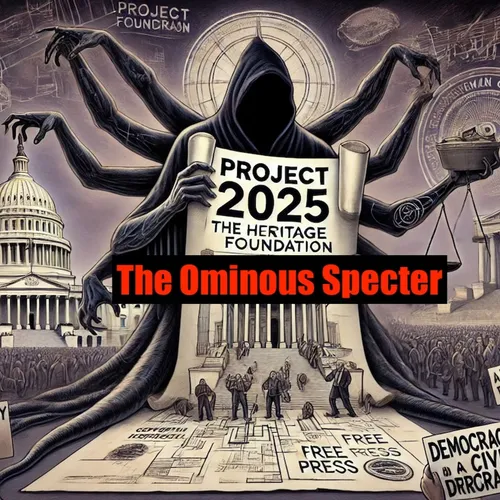Radical Transformation or Dangerous Power Grab? The Debate Over Project 2025's Vision for America
- Author
- Quiet.Please
- Published
- Sun 12 Jan 2025
- Episode Link
- https://www.spreaker.com/episode/radical-transformation-or-dangerous-power-grab-the-debate-over-project-2025-s-vision-for-america--63667362
As I delved into the intricacies of Project 2025, a comprehensive policy initiative crafted by the Heritage Foundation, I was struck by the sheer scope and ambition of its proposals. This 900-page blueprint, released in April 2023, outlines a radical transformation of American governance, touching on virtually every aspect of federal policy, from education and healthcare to technology and environmental regulation.
At its core, Project 2025 is a manifesto for a conservative revolution, envisioning a federal government reshaped in the image of a strong, centralized executive branch. The project's architects argue that the current system of independent federal agencies undermines the democratic republic, and they propose placing the entire executive branch under direct presidential control. As Heritage Foundation President Kevin Roberts puts it, "The notion of independent federal agencies or federal employees who don't answer to the president violates the very foundation of our democratic republic."[1]
One of the most striking aspects of Project 2025 is its plan to dismantle and reconfigure several key federal agencies. The Department of Education, for instance, would be abolished, with its programs either transferred or terminated. Education would be left to the states, with federal funding for low-income students, such as Title I of the Elementary and Secondary Education Act of 1965, allowed to expire. Instead, public funds would be channeled into school vouchers, even for private or religious schools, reflecting the project's belief that education is a private rather than a public good[1].
The Department of Homeland Security would also face significant changes, with Project 2025 advocating for its dismantling. This move is part of a broader strategy to reshape national security and immigration policies, including the arrest, detention, and mass deportation of illegal immigrants and the deployment of the military for domestic law enforcement[1].
In the realm of healthcare, Project 2025 proposes drastic cuts to Medicare and Medicaid, and it urges the government to explicitly reject abortion as healthcare. The plan also seeks to eliminate coverage of emergency contraception and use the Comstock Act to prosecute those who send and receive contraceptives and abortion pills. This stance is part of a broader agenda to roll back reproductive rights and impose conservative moral values on healthcare policy[1].
The project's vision for science and research is equally transformative. It prioritizes fundamental research over applied research, arguing that many current programs act as subsidies to the private sector. Climate change research would be significantly curtailed, with the U.S. Global Change and Research Program facing critical analysis and potential rejection of its assessments prepared under the Biden administration. The Environmental Protection Agency (EPA) would be restricted from using "unrealistic" projections of climate change impacts, and its science activities would require clear congressional authorization[4].
Project 2025 also targets the tech and media landscape, proposing significant reforms to the Federal Communications Commission (FCC) and the Federal Trade Commission (FTC). The plan includes increasing agency accountability, reducing wasteful spending, and promoting national security and economic prosperity. It suggests that Big Tech companies should contribute to the Universal Service Fund, currently funded through telephone bills, to support the expansion of 5G and satellite connectivity. Additionally, the project advocates for revising Section 230 of the Communications Decency Act, limiting social media's ability to moderate content and ban individuals from their platforms[3].
The implications of these proposals are far-reaching and have sparked intense debate. Critics argue that Project 2025 represents a blueprint for an...
